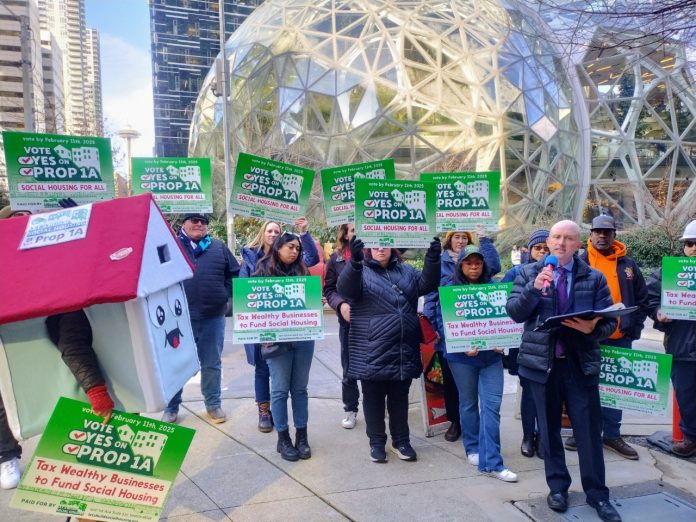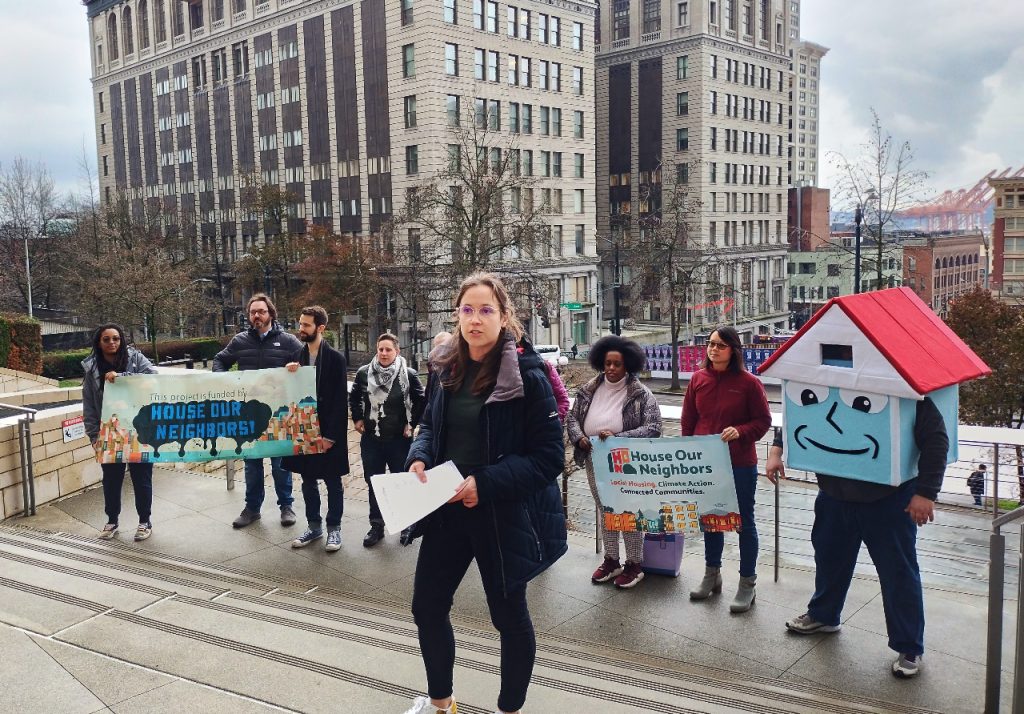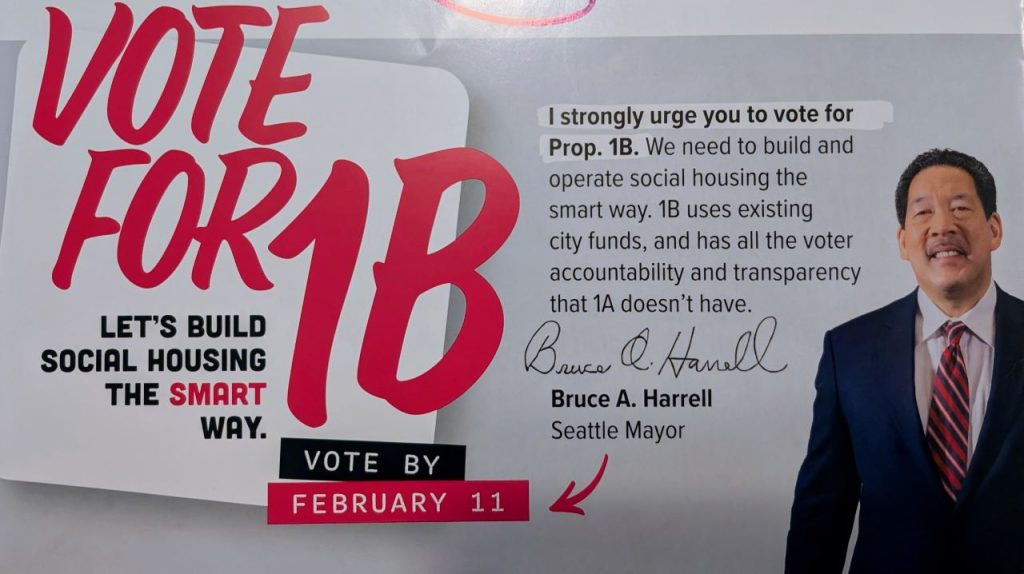
On Friday, backers of Proposition 1A, the initiative creating a dedicated funding source for Seattle’s social housing developer, took to the streets of Denny Triangle in an attempt to highlight a flood of cash pouring in to support a competing measure. Standing in front of the Amazon Spheres, members of House Our Neighbors, the MLK Labor Council, and the 37th District Democrats decried an attempt to sway special-election voters with a last-minute wave of campaign cash.
The recipient of all that cash is pro-Initiative 1B political action committee called “People for Responsible Social Housing.” The Seattle City Council established Initiative 1B as an alternative to stand alongside 1A and its 5% payroll tax paid by companies within Seattle on the portion of payroll that goes toward compensating individual employees in excess of $1 million. It is largely companies with very high paid executives that are pumping money into the effort to derail Prop 1A.
A pair of $100,000 donations by both Amazon and Microsoft in late January joined contributions from an array of business moguls and corporations, including Puget Sound Energy, Alaska Airlines, and Russell Investments. Glassblowing artists Dale and Leslie Chihuly chipped in $1,000 each. The late donations have pushed total pro-1B political spending past $500,000 — more than doubling the amount that Prop 1A backers have raised. Guy Oron at Real Change has a full breakdown of the campaign cash.
In contrast with 1A, which would create the first dedicated funding source for social housing in Seattle’s history, Initiative 1B would divert $10 million annually from Seattle’s existing JumpStart high-earner payroll tax to fund affordable housing targeting residents making 80% of King County’s area median income or below, instituting no new funding source of its own. Last fall, the Seattle City Council put forward the alternative after they received the grassroots Initiative 137, which was signed by more than 38,000 city residents, after delaying action that would have put the measure on the higher-turnout November ballot.

The Seattle Metropolitan Chamber of Commerce, which has donated over $40,000 to promote Prop 1B (including some in-kind donations), was one of the most outspoken opponents of the JumpStart payroll tax when it was proposed in 2020, even taking the measure to the state court of appeals after it was approved. Now, the business advocacy group is on board with utilizing JumpStart revenues as long as it translates to no additional taxes on the city’s businesses.
“Jeff Bezos already bought one Washington. He will not buy this one,” Katie Garrow, Executive Secretary-Treasurer of the MLK Labor council, told the crowd. “At a time when Elon Musk, Sam Altman, Jeff Bezos, Mark Zuckerberg and yes, even [Microsoft CEO] Satya Nadella are bending the knee to President Trump and turning D.C. into an oligarchy, Seattle is the last stand. We cannot let them hoard all the power wealth and resources of our beautiful region. They are not like us. They are not even mainstream. They are a malignant political force who are keeping us house and rent poor.”
The last-minute check from Amazon may remind Seattle voters of 2019, when the company donated $1.45 million days before the general election to support a slate of centrist city council candidates. That move was widely seen as backfiring, with only two of the seven candidates winning their elections. But with this year’s lower-turnout special election, Seattle’s largest companies don’t seem worried about a repeat performance.
Much of the newly donated cash is funding mailers featuring Seattle Mayor Bruce Harrell touting a “smart way” to build social housing, and discounting the Seattle Social Housing Developer — which was established in 2023 via a separate grassroots initiative — as inexperienced. Yet option 1B wouldn’t even fund social housing, which uses rents generated by working-class tenants making around the county’s median income to cross subsidize other lower income tenants who can’t pay as much, creating mixed-income communities. Instead, Prop 1B sticks to the traditional model that builds exclusively low-income housing, often relying on federal subsidies to close the gap to cover costs — replacing what numerous nonprofits already do.

Former city council candidate Ron Davis, who broke down the ways that pro-1B mailers have been deceptive in an article last week in The Urbanist, was on hand Friday to debunk those talking points in person.
“Seattle said no to Amazon last time when they screwed with our elections, and we’re going to do it again,” Davis said. “We all know that if Seattle voters learn that Amazon’s been bankrolling Donald Trump and is trying to buy this election, they will not vote with that. So we are not going to let them quietly line their pockets.”
Recent polling from the Northwest Progressive Institute showed a very tight race between 1A and 1B, with the grassroots social housing measure only two points ahead of the council-concocted plan B. Voters have until 8pm on Tuesday, February 11 to get their ballots in — but as of Friday, only around 15% of Seattle voters had done so. While I-135, the 2023 initiative that set up the social housing developer, passed by a strong 14-point margin, this election is poised to be much closer.
“There’s no question that the Democratic Party is a big tent,” 37th District Democrats chair Mary Scanlon said. “But no matter how big our tent is, it has no room in it for big companies that throw piles of money at our elections to keep their own taxes low while preventing new funding for affordable housing.”
Ryan Packer has been writing for The Urbanist since 2015, and currently reports full-time as Contributing Editor. Their beats are transportation, land use, public space, traffic safety, and obscure community meetings. Packer has also reported for other regional outlets including BikePortland, Seattle Met, and PubliCola. They live in the Capitol Hill neighborhood of Seattle.

